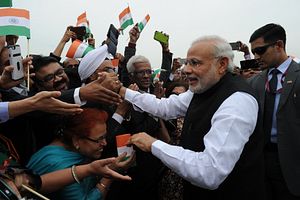July is the month when the monsoon rains finally reach India’s shores, bringing with them relief and prosperity. This year they shall be accompanied by an unlikely companion: South Korean President Moon Jae-in, who will be in India for a four-day state visit starting July 8. This long-overdue visit comes at a time when the geopolitical landscape of Northeast Asia is evolving due to shifting dynamics on the Korean Peninsula, not to mention India’s own general election in early 2019. Despite internal and external pressures, and amid uncertainty over regional activities, both countries seem to have understood that a summit meeting should come sooner than later. Much like a good monsoon.
The Moon-Modi rendezvous has been keenly sought since the early days of the Moon administration, which came to power in May 2017. During the election campaign, Moon pledged that he would elevate ties with India to the level of Korea’s relations with the four major powers in and around the Korean Peninsula – China, Japan, Russia and the United States. This is a significant departure from Korea’s traditional foreign policy, and is a timely, even necessary, development. A pressing need for diplomatic diversification in the age of escalating geopolitical as well as economic uncertainty is the rationale behind Moon’s ambitious move. It is partly a hedging strategy amid the U.S.-China tug-of-war in the region, and partly a forward-looking move to address how Korea and India can together meet the demands of a dynamic future.
This will not be the first time South Korea extends its hand to India. South Korean President Roh Moo-hyun’s 2004 visit to India resulted in the establishment of the “Long-term Cooperative Partnership for Peace and Prosperity,” which paved the way for the start of bilateral Free Trade Agreement (FTA) negotiations. After years of close economic ties, the Moon administration is now gearing up to expand its cooperation with India with equal, if not more, emphasis on strategic understanding, cultural appreciation, and people-to-people engagement. Such optimism is not one-sided. Modi has been religiously promoting his “Act East Policy,” which accompanied the prime minister during his visit to Korea in 2015, when both countries elevated bilateral ties to a “Special Strategic Partnership,” and the Korean government agreed to provide $10 billion to support India’s priority infrastructure sectors.
Moon’s commitment to the strengthening of Korea’s ties with India has been clear since he took office. Early on, Moon sent a Special Envoy, former Cultural Minister, Chung Dong-chea, to India to explain his diplomatic vision and deliver his wish for enhanced bilateral relations. This was followed by the official announcement of the policy in November last year. During his tour to three ASEAN countries, Moon outlined his “3P” vision to build a people-centered, peace-loving and mutually prosperous community through the New Southern Policy aimed at boosting ties with India as well as ASEAN member countries. Soon after, one of Moon’s foreign policy aides, Shin Bong-kil was dispatched as an Ambassador to India, a post traditionally occupied by career diplomats. The Korean National Diplomatic Academy opened the ASEAN-India Research Centre within its Institute of Foreign Affairs and National Security in February this year, and the government is currently working on an institutional framework that will oversee the development and implementation of the policy.
South Korean President Moon’s maiden visit to India will reinforce his abiding commitment to the country, fortifying a historical partnership that dates back over 2,000 years. The two countries are expected to forge closer political and defense ties and to make tangible headway in advancing Korea’s $10 billion assistance towards the development of India’s infrastructure. They are also expected to reach an early harvest agreement on upgrading the Comprehensive Economic Partnership Agreement (CEPA), and to enhance cooperation in various areas, from technology and cybersecurity to tourism and culture.
India’s expectations for the visit will be shaped by its growing global footprint, and its desire to invest in relationships in the region that help avoid polarizing confrontation. Modi will also look to Korea to continue his pitch for inviting foreign investment and cooperation, especially in large-scale infrastructure projects and heavy industries such as defense and shipbuilding.
This year, farmers in Orissa may have put their faith in amphibian matrimony to appease the monsoon gods. However, to make a success of the Moon-Modi summit requires no divine intervention. For the hundreds of millions of Indian households which already regard South Korean companies such as Samsung and Hyundai as no different to home-grown names such as Reliance and Tata, the forthcoming state visit is an opportune moment for Moon’s people-, peace-, and prosperity-focused vision to find favor in the hearts of 1.3 billion Indians.
Soyen Park, a Korean national, is an independent researcher based in New Delhi, India.

































